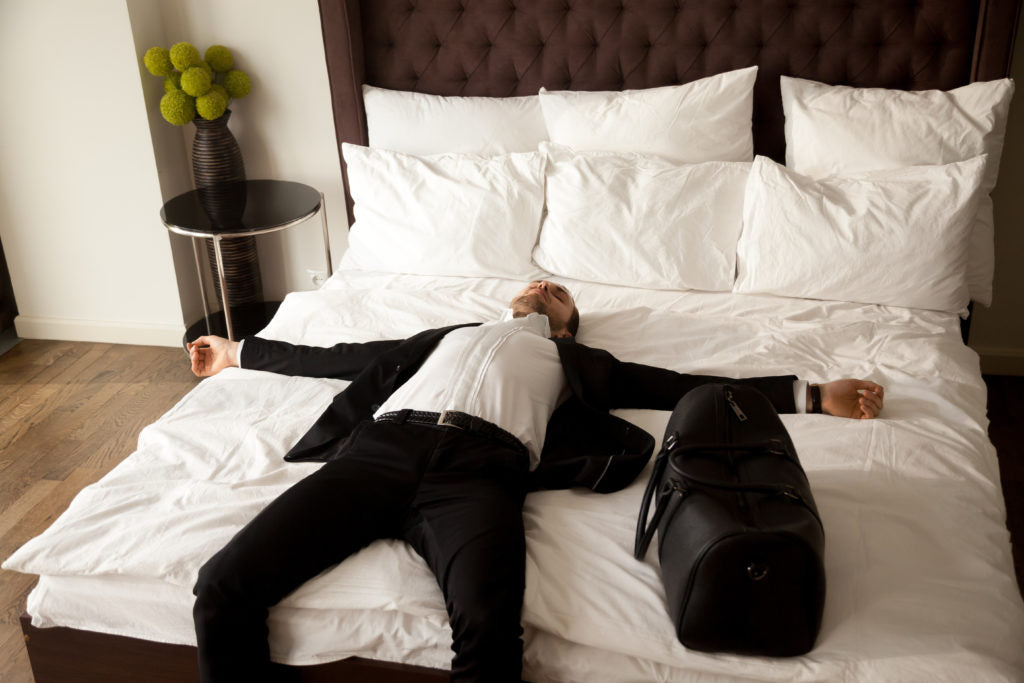How to Get Tranquil Sleep in Strange Places

Sleeping and travel don’t necessarily go so well together. Have you ever come back from a vacation feeling more tired and run down than you did when you left? We all love to travel, but no matter how nice our “home away from home,” traveling can wreak havoc on our sleep. Here are five tips for getting high-quality sleep wherever you are.
- Stick to a routine. One of the biggest troubles with travel is the uneven sleep schedule that can result. Between early-morning sights to see and late-night activities, sleep can fall by the wayside. Get to bed by at least a semi-reasonable hour and resist the urge to sleep in until noon. Pick a comfortable wake-up hour, say 8:00 or 8:30, and try to be awake by that time every day—even if it means taking a short nap after lunch. If that wake-up time is an hour or more later than your workday wake-up, begin waking up earlier toward the end of your vacation so that you can avoid a rude awakening on your first morning back.
- Take your own pillow. Having something familiar, especially something that you find particularly comfortable, can make the difference between sleeping soundly or tossing and turning. Take a pillow that you use nightly at home—one that correctly aligns your spine while keeping you relaxed and comfy—and enjoy better sleep even in a car or on a train.
- Block light. Take a facemask if you plan to sleep in transit, and ask whether your hotel rooms have heavy draperies to block city light or early-morning sunshine. Blocking light can help you sleep soundly, especially if you tend to wake up earlier on workdays than your planned wake-up time during your vacation.
- Cancel noise. Whether you use headphones, earplugs, or a portable white noise machine, canceling out unfamiliar sounds can improve your quality of sleep. If you plan to use headphones or earplugs, try sleeping with them before you leave home to make sure that you’re comfortable during your vacation.
- Exercise. As little as 20 or 30 minutes of exercise each day can improve your sleep at night—as long as you work out at least 4 to 6 hours before bedtime. If you have access to a gym, use it. If not, take a walk. The more you move, the better your chances to sleep soundly.

Camping
Most of these techniques will work for you when camping or hiking as well, though it’s less feasible to lug a full-sized pillow or white noise machine into the wilderness. To sleep well in the woods, switch to your camping pillow a few days before you leave the house, so you can get used to its feel. Consider taking lightweight earplugs to help cancel unfamiliar nighttime noises. Take a sleeping bag that’ll keep you comfortable for the season (not too hot or too cold). And don’t forget to take a sleeping pad—they can make all the difference in keeping you comfortable on the ground.
Sleep Well No Matter Where You Go
If you’re exhausted enough that sleeping anywhere is easy, you definitely need a vacation. But even if you’re well rested, sleeping well on vacation is possible with a little preparation. Plan ahead, pack well, and you’ll return from your trip rested and ready to return to your daily life.
Author Bio: +Michelle Gordon is a sleep expert who researches and writes about sleep and health, and is an online publisher for the latex mattress specialist Latexmattress.org.


